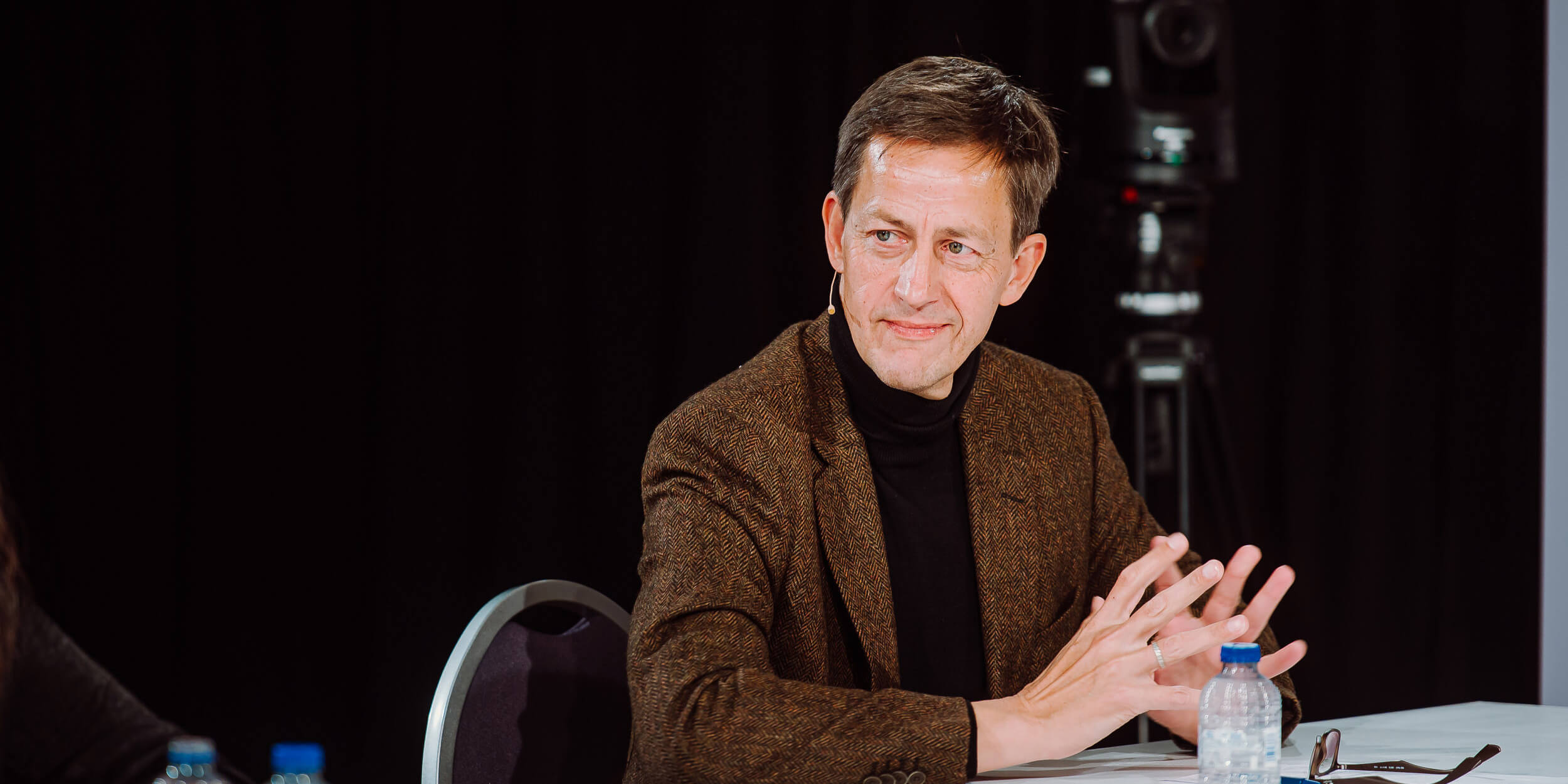- The absence of a mapped-out plan makes you curious and receptive to new opportunities.
- Getting your story straight as an employer is necessary, but you also have to live up to it.
- Trust is more important than control.
On May 6th, TriFinance organized a virtual C-level talk with HR professionals. We welcomed 3 top HR professionals and an academic expert to our studio. They discussed their unique career paths and shared their vision on current career trends. Read the summary below or watch the full recording.

The debate begins with the question of whether the guests had a clear ‘plan’ at the beginning of their careers. "No," answers HR Director of Mediahuis Martine Vandezande, Chief HR Officer of Proximus Jan Van Acoleyen and Peter Geiregat, until recently Chief People Officer of Showpad. They are debating under the skillful leadership of moderator Lesley Arens (Founder ZigZagHR) before a virtual audience of more than a hundred.
According to them, a successful career is a matter of coincidence, of encounters, of learning, of seizing opportunities. "Gradually you get to know your strengths and weaknesses. You experience what gives you energy. After all, work should be fun," says Jan Van Acoleyen. Prof. dr. Sofie Jacobs joins our panel from an academic point of view on careers. "It's a matter of keeping your eyes open, looking over the wall, gaining experience, and building a unique combination of qualities and skills. Add to that a personal compass based on values."
The evolution towards a ‘relational’ collaboration between employer and employee is necessary to be able to flexibly attract and retain the necessary external or temporary talents in the organization.
Prof. dr. Sofie Jacobs (AMS)
The professor emphasizes: "The flexibilization of labor is on the agenda." For her, it does not mean that the issue has already permeated within the economy. "Research shows that there is a slight growth, but about 60 percent of employers are not engaged in it at all." She adds that when it comes to job mobility, half of the employees say they are ready for something else.
"Internal and external mobility is good for the employee's position in the labor market. However, employers still put job security first. At the moment, the relationship between employer and employee is still primarily ‘transactional’. This will need to evolve into a 'relational' partnership in order to be able to flexibly attract and retain the necessary external or temporary talent in the organization."

‘Playground' must be big enough
Attracting candidates and keeping employees are two sides of the same coin. For Martine Vandezande, employers don’t need to fear workforce turnover: "You also get new people in." Prof. dr. Sofie Jacobs adds: "It is better that employees leave than that they remain without commitment." The Mediahuis top woman completes: "In order to engage employees permanently, the 'playground' has to be big enough. You need to offer them the widest possible range."
To me, it doesn't matter in which form of labor people work with us. It's just that the legislation is lagging behind for the new ways.
Martine Vandezande (Mediahuis)
For her, the flexibilization of labor is mainly a result of the scarcity in the labor market. Switching to a personal relationship should help to find suitable people. "To me, the form of labor isn’t important. It's just that the legislation is lagging behind for the new ways."
Jan Van Acoleyen comments that flexibilization is still primarily a matter for the happy few. "Let's not deny that a lot of employees have little appetite for this flexibility. As an employer, you can try to enthuse your employees by offering the opportunity to choose through more jobs."
You have to take into account, according to Peter Geiregat, that the purpose of an organization is increasingly important to the younger generations of employees. "Generation Z has a high ethical and social consciousness, and younger candidates keep a close eye on whether an organization fits their narrative. The employer needs to make its purpose tangible. At Showpad, it was about making people successful through technology, about helping people internally and externally."
Younger candidates keep a close eye on whether an organization fits their narrative. The employer needs to make its purpose tangible.
Peter Geiregat (ex-Showpad)
Career nomads
"Getting your story straight as an employer is necessary, but you also have to live up to it. Otherwise, you're lost. This authenticity is vital, because you are increasingly dealing with 'career nomads', who take their careers into their own hands," Martine Vandezande emphasizes. In her view, this means that employers must increasingly offer candidates tailor-made solutions. "It is better to speak of 'customization' in this context than of 'individualism'. The latter has a negative character and the evolution we are experiencing is not."
For Jan Van Acoleyen, the individualism of employees is not in contrast to the connectedness they strive for. "There is a need for predictability in the uncertain world we live in. With that comes more and more connectedness and doing what you believe in."

Lessons learned from the corona pandemic
"The corona pandemic shows that there is a need for connectedness at work," says prof. dr. Sofie Jacobs. "You have digital connectivity, but bringing people together physically is important.”
"Executives experienced that things don't necessarily go better when they have their employees around them in the office. Trust is more important than control. Let's remember that from now on," emphasizes Jan Van Acoleyen. He also wants to retain the changes in commuting, as well as the increased focus on people's physical, mental and financial well-being.
Trust is more important than control. Let's remember that from now on.
Jan Van Acoleyen (Proximus)
To this, Peter Geiregat adds the way leaders communicate. "Globally, increased employee engagement is being observed. This is partly due to flexibility, but also due to the communication of leaders. In a virtual world, they have no choice but to communicate better and more explicitly. They cannot assume that everyone in the office has understood. Managers have gone through a learning curve to communicate more clearly on what is expected. There is also a different dynamic in virtual meetings. It is no longer the loudest ones in the room that dominate the meeting."
Teleworking
“People discovered the benefits of working from home. They have more time to invest in self-development, both professionally and personally,” acknowledges Martine Vandezande. Less commuting has to do with teleworking, and she states that working in the office or at home depends on the activity you perform. She sees the office more as a meeting place. “Virtually, you can create connectedness across national borders," she says. Jan Van Acoleyen adds that an organization has a well-defined culture. "Changing employers does not mean switching from one virtual environment to another. An organization defines itself by its culture."
"The past year has shown that people are resilient in times of crisis. It would be good if we could go one step further for all the items mentioned. Falling back into old patterns would be a shame," concludes prof. dr. Sofie Jacobs.

Career tips from our guests
- Explore different possibilities at the beginning of your career. Your common thread will gradually become apparent.
- The absence of a mapped-out plan makes you curious and receptive to new opportunities.
- Coincidental encounters with people are often decisive. Sometimes it seems like a coincidence, but it is also a result of your intuition, which is a consequence of the information you have processed.
- In an environment with a high standard of quality and a high tolerance for mistakes, you can grow tremendously.
- You learn a lot about your career path by disconnecting for a while and looking back, especially at the moments that seem like a failure.
- Don't cling to the illusion of stability. Actively consider how you can increase your resilience to thrive more easily in a world where change is the only constant.
TriFinance Human Development
Recently, TriFinance launched a new service line in Human Development. From now on, our clients can also count on us for project support and interim management of their HR department. Discover how TriFinance can help your HR organization.
Related content
-
Blog
How the technology of Microsoft Fabric can help you maximize the value of your data
-
Article
How Lakehouse technology can help solve your siloed data problem
-
Blog
EFRAG’s simplified ESRS: what it means and why sustainability reporting still matters
-
Blog
Webinar takeaways: How to deal with common challenges in your data projects
-
Article
Why CFOs can’t afford to ignore Data Engineering in 2025
-
Article
Power BI training: from data literacy and data modeling to strategic reporting in finance
-
Career as Consultant
Junior Finance Consultant | Public Sector
-
Career as Consultant
Medior Finance Consultant | Public Sector
-
Career as Consultant
Senior Finance consultant | Public sector
-
Career as Consultant
Junior Consultant Public Procurement | Public Sector
-
Career as Consultant
Medior Consultant Public Procurement | Public Sector
-
Career as Consultant
Senior Consultant Public Procurement | Public Sector